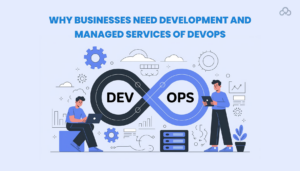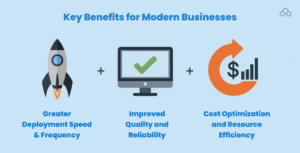
In today’s fast-paced digital landscape, businesses face mounting pressure to deliver software solutions quickly while maintaining quality and reliability. However, traditional development approaches often create bottlenecks that slow down innovation and frustrate teams. This is where DevOps consulting companies step in, offering specialized expertise that transforms how organizations build, deploy, and manage their applications.
For organizations, adding value and differentiating themselves requires fully embracing DevOps Associated development and managed services significantly improves efficiency. These businesses have the capability to solve complex problems, so all enterprise organizations would like to access the new managed and consultancy DevOps services. Through guidance and consulting, they find it easy to connect departments and resolve matters such as prolonged deployment cycles and frequently failing systems. Through good Digital Transformation, operations costs get slashed, along with improving customer satisfaction.
Understanding DevOps Development Services
The avenging approach that includes people, processes, and technology, which a company designs with the objective of having a seamless operation by the combination of systematic cooperation of development and operations groups is called DevOps development services. Instead of silos, these services rely on logic and result driven smothering systems. For them, every workflow is crucial.
Strategic DevOps consulting firms have expertise in automation, continuous integration, and the deployment processes. They know that a successful DevOps implementation goes beyond automation, requiring a deep-rooted culture change that embraces collaboration, shared responsibility, and openness across silos.
Key features of DevOps development services comprise infrastructure as code, automated testing, continuous monitoring, and security integration. These components help to quickly adapt to changes in business needs, while also maintaining systemic performance and reliability.
Advantages of Managed DevOps Services
For businesses that wish to focus on streamlining key revenue-driving activities while keeping their technology infrastructure up to date, managed DevOps as a services offer ongoing optimization and support. These services provide uninterrupted, proactive maintenance, and rapid incident response capabilities, as well as round-the-clock monitoring, ensuring systems function seamlessly.
Incorporating managed services from DevOps consulting companies allows businesses to gain a team that is abreast with the latest developments in the field, eliminating the need for large in-house teams, which significantly cuts costs and alleviates recruitment headaches.
Managed services additionally come with scalability benefits. With the growth and evolution of an organization, its DevOps needs shift as well. Managed service providers are quick to ramp up resources and capabilities where they are needed. This flexibility allows organizations to take advantage of market opportunities without having to worry about their technical infrastructure.
Real-World Success Stories
Netflix is one of the most notable examples of DevOps success. The streaming service processes billions of content delivery hours each month, which demands extreme reliability and scalability. Through the adoption of DevOps and collaboration with specialized consulting teams, Netflix achieved remarkable increases in deployment frequency—thousands of changes per day while sustaining 99.99% uptime.
Another compelling case is Etsy, the online marketplace that changed its deployment strategy from releasing once per month to several times per day. After engaging in DevOps outsourcing and implementing CIP practices, Etsy was able to reduce the deployment time to minutes from hours while enhancing system stability.
Amazon’s journey with DevOps illustrates the impact of the shift in corporate culture. They transitioned from a monolithic architecture to microservices, allowing the creation of independent and agile team deployments. Supported by DevOps consulting, this change permitted Amazon to advance from a bookstore to a worldwide technology leader while providing balanced operational performance.
Key Benefits for Modern Businesses

Greater Deployment Speed & Frequency
Companies enjoying the support of DevOps as a services usually see notable changes in deployment frequency. Businesses that used to deploy software once every month or quarter can now do so on a daily or hourly basis. This lets companies respond to market shifts, customer comments, and competition much faster.
The speed improvements come from automation, standardization, and elimination of manual processes that traditionally created bottlenecks. DevOps consulting companies implement continuous integration and continuous deployment (CI/CD) pipelines that automatically test, validate, and deploy code changes, reducing the time from development to production.
Improved Quality and Reliability
Despite faster deployment cycles, DevOps practices actually improve software quality through automated testing, continuous monitoring, and rapid feedback loops. Subsequently, when issues arise, teams detect and resolve them quickly, often before users notice any impact.
DevOps Consulting Services cover all detection challenges through unit and integration tests covered by automated security questions. This way, the quality of developed solutions is maintained even when the speed of development increases.
Cost Optimization and Resource Efficiency
Companies utilizing DevOps consulting services generally experience marked cost savings due to the improved capture of resources, decreased downtime, and reduced manual work. Operational savings result from optimization of cloud infrastructure, automated scaling, and resource provisioning.
Automation as a Service offerings makes it possible for DevOps service providers to minimize workload and routine processes, thereby allowing personnel to focus on higher value initiatives. This productivity improvement drives enhanced profitability.
Strategic Implementation Approaches
Assessment and Planning Phase
Successful DevOps implementation begins with comprehensive assessment of current processes, tools, and culture. DevOps consulting companies conduct thorough evaluations to identify pain points, bottlenecks, and opportunities for improvement.
This assessment phase includes analysis of existing infrastructure, development workflows, deployment processes, and team dynamics. The insights gained inform the development of a customized DevOps strategy that aligns with business objectives and technical requirements.
Technology Stack Selection and Integration
Choosing the right tools and technologies is crucial for DevOps success. DevOps consulting companies possess deep expertise in evaluating and selecting tools that integrate seamlessly with existing systems while providing the capabilities needed for future growth.
The technology stack typically includes version control systems, CI/CD platforms, containerization tools, monitoring solutions, and cloud infrastructure components. Professional guidance ensures that these tools work together harmoniously and provide maximum value.
Culture and Process Transformation
A purely technical implementation of DevOps will not bring success. An organizational cultural shift to collaboration, shared responsibility, and continuous improvement is needed. DevOps consulting companies help achieve this cultural change by training, coaching, and change management.
Transforming processes means redesigning workflows, creating communication frameworks, and establishing mechanisms for reflection and feedback, as well as tools for learning and continuous adaptation. Sustainable DevOps adoption is achieved through this integrated approach.
Addressing Common Challenges in Implementation
Reluctance to Change
Many organizations encounter resistance when implementing DevOps practices. However, DevOps consulting companies help address this challenge by demonstrating quick wins, providing comprehensive training, and gradually introducing changes that build confidence and momentum.
Effective change management entails engaging stakeholders, communicating the benefits clearly, and actively involving team members in the transformation. Solving problems head on with proactive solutions that address concerns, along with demonstrable results, fosters the adoption of DevOps and overcomes resistance.
Managing a Skill Gap
The intricacy of DevOps tools and practices might give rise to skill gaps that impede proper implementation within an organization. DevOps support services resolve this issue with an appropriate mix of knowledge transfer, hands-on training, and mentorship that develops internal capabilities.
Organizations gain immediate expert assistance while developing long-term capabilities. This blended approach helps ensure that the relevant DevOps practices are implemented successfully and can be sustainably maintained and evolved over time.
Strengthening Your DevOps Strategy Against Future Disruptions
New Technologies and Trends
The development of new technologies such as artificial intelligence, machine learning, and edge computing continues to reshape the DevOps landscape. Specialized consulting firms are positioned to track these trends and assist organizations in planning for future shifts in technology.
Businesses are able to obtain advance information and opportunities to adopt new technologies early from expert providers, thereby allowing them to keep their competitive edge. This approach effectively preserves the value of DevOps investments over time.
Ongoing Changes and Enhancements
Continuously improving processes is one of the objectives of adopting DevOps to a company; as such, its practices should enable the organization to consistently improve over time. Undertaking regular reviews allows the organization to identify gaps and opportunities to further optimize their processes and implement the identified enhancements.
DevOps consulting firms offer specialized deals for larger organizations that need ongoing assistance for metrics-related improvement within the organization. Changes that yield value are analyzed, predicted using analytics, and implemented using a predefined process. Having a continuous refinement DevOps resolves the need for undergoing complete restructuring later on in the project lifecycle.
Measuring Success and ROI
Key Performance Indicators
Achieving success in the implementation of DevOps requires diligent monitoring of several KPAs that represent advancement and benefit. KPIs are established using outside consulting agencies which guarantee the impact of DevOps along with tracking systems to monitor metrics.
Some important KPIs are deployment frequency, lead time for changes, mean time to recovery, change failure rate. KPAs provide objective proof for success allowing continuous improvements to be made based on facts.
Business Impact Assessment
Apart from technical metrics, organizations need to focus on the business impact as well. Customer satisfaction, revenue growth, operational costs and other factors must also be considered.
Deriving business metrics is made easy with DevOps consulting companies as they also create dashboards needed to showcase the value of DevOps best practices to the stakeholders. The ability to track these metrics justifies the value and assists in claiming a positive return on investment.
Conclusion
Achieving full digital transformation brings about new operational and software development challenges for an organization. This is where a DevOps consulting company comes in with the knowledge, frameworks, and assistance necessary for implementing a successful shift. Leveraging skilled providers allows organizations to optimize their development processes, improve quality and customer satisfaction while lowering overall costs.
DevOps success stories such as Netflix, Etsy, and Amazon showcase the remarkable impact of effective implementation. All these organizations were able to achieve incredible outcomes by collaborating with specialized consulting partners to navigate implementation roadblocks and adopting best practices.
With continuous market innovation and competitive requirements, the demand for professional DevOps development and managed services will only increase. Early adopters of these capabilities will be better positioned to thrive in the evolving digital landscape.
FAQs
Q1: How long does it typically take to see results from DevOps implementation?
In our experience, most organizations begin seeing benefits in the first 3-6 months of the DevOps implementation period. Significant transformation and cultural change, however, tends to take 12-18 months. This all depends on the organization’s starting point, system complexity, and willingness to change.
Q2: What is the distinction between DevOps consulting and managed DevOps services?
DevOps consulting focuses on strategy, planning, and implementation guidance, while managed services provide ongoing operational support and maintenance. Many organizations benefit from consulting during the initial implementation phase, then transition to managed services for long-term support and optimization.
Q3: How do I pick the best DevOps consulting company for my business?
Check provider credentials to verify reputation within your industry, technical qualifications, and successful project implementations. Assess how they deal with cultural change, tool selection, and support as well. Ask for relevant case studies and testimonials from comparable companies.
Q4: Which costs can I expect from the implementation of DevOps in my business?
Costs can differ drastically due to the size and complexity of the organization as well as the scope of implementation. The range for initial consulting and setup costs is in the tens to hundreds of thousands of dollars. The good news is that most organizations are able to achieve positive ROI within 1-2 years through enhanced efficiency and lower operational expenses.
Q5: Is it possible for small businesses to acquire such DevOps consulting services?
Absolutely. DevOps principles and practices can benefit organizations of all sizes. Small businesses often see proportionally greater benefits due to their ability to implement changes quickly and adapt to new processes. Many DevOps consulting companies offer scalable solutions designed specifically for smaller organizations.
Do you like to read more educational content? Read our blogs at Cloudastra Technologies or contact us for business enquiry at Cloudastra Contact Us